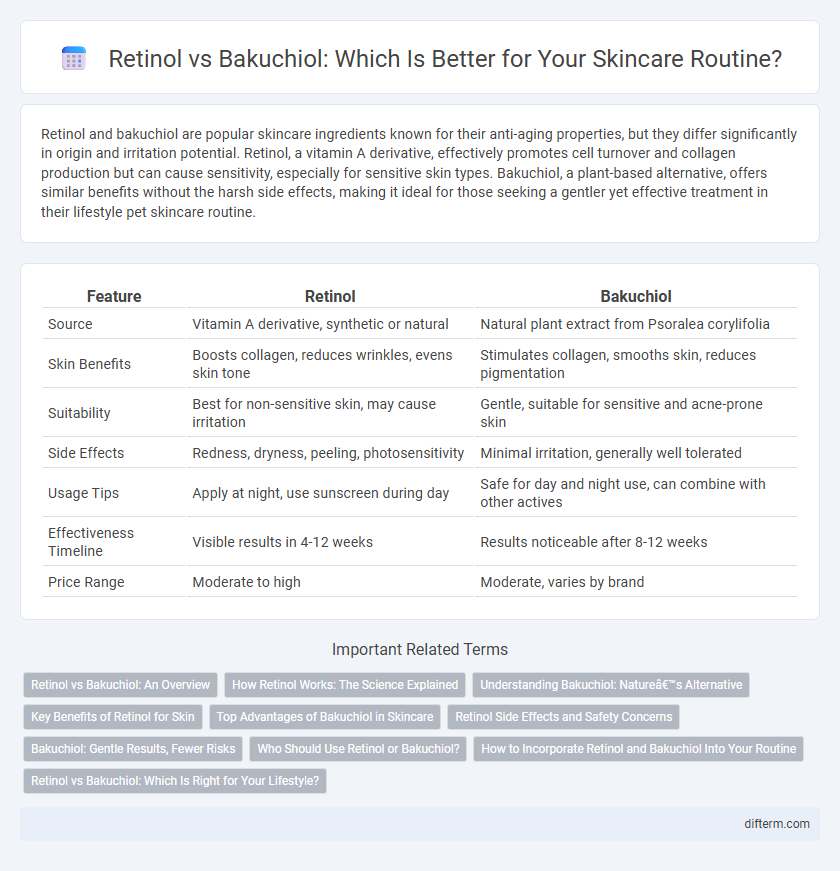Retinol and bakuchiol are popular skincare ingredients known for their anti-aging properties, but they differ significantly in origin and irritation potential. Retinol, a vitamin A derivative, effectively promotes cell turnover and collagen production but can cause sensitivity, especially for sensitive skin types. Bakuchiol, a plant-based alternative, offers similar benefits without the harsh side effects, making it ideal for those seeking a gentler yet effective treatment in their lifestyle pet skincare routine.
Table of Comparison
| Feature | Retinol | Bakuchiol |
|---|---|---|
| Source | Vitamin A derivative, synthetic or natural | Natural plant extract from Psoralea corylifolia |
| Skin Benefits | Boosts collagen, reduces wrinkles, evens skin tone | Stimulates collagen, smooths skin, reduces pigmentation |
| Suitability | Best for non-sensitive skin, may cause irritation | Gentle, suitable for sensitive and acne-prone skin |
| Side Effects | Redness, dryness, peeling, photosensitivity | Minimal irritation, generally well tolerated |
| Usage Tips | Apply at night, use sunscreen during day | Safe for day and night use, can combine with other actives |
| Effectiveness Timeline | Visible results in 4-12 weeks | Results noticeable after 8-12 weeks |
| Price Range | Moderate to high | Moderate, varies by brand |
Retinol vs Bakuchiol: An Overview
Retinol, a vitamin A derivative, is widely acclaimed for its proven efficacy in reducing wrinkles, improving skin texture, and boosting collagen production, while bakuchiol, a plant-based alternative extracted from Psoralea corylifolia, offers similar anti-aging benefits with fewer reported irritations. Clinical studies highlight retinol's faster and more potent results in cellular turnover compared to bakuchiol, which is often preferred by individuals with sensitive skin due to its gentle, non-irritating properties. Both compounds support skin rejuvenation, though selecting between retinol and bakuchiol depends on skin tolerance, desired outcomes, and product formulation.
How Retinol Works: The Science Explained
Retinol works by accelerating skin cell turnover, stimulating collagen production, and reducing the appearance of fine lines and wrinkles through its conversion into retinoic acid, which binds to skin cell receptors to promote regeneration. This vitamin A derivative penetrates deep into the epidermis, enhancing cellular communication and improving skin texture and tone over time. In comparison, bakuchiol offers a gentler alternative with antioxidant and anti-inflammatory properties, mimicking retinol's effects without causing significant irritation.
Understanding Bakuchiol: Nature’s Alternative
Bakuchiol, derived from the babchi plant, offers a natural alternative to retinol by providing similar anti-aging and skin-smoothing benefits without the irritation commonly associated with synthetic retinoids. Rich in antioxidant properties, bakuchiol helps reduce fine lines, improve skin elasticity, and promote a radiant complexion, making it suitable for sensitive skin types. Scientific studies highlight bakuchiol's ability to stimulate collagen production and reduce inflammation, positioning it as a plant-based solution for effective and gentle skincare.
Key Benefits of Retinol for Skin
Retinol is renowned for its powerful anti-aging properties, promoting collagen production and accelerating cell turnover to reduce fine lines and wrinkles. It effectively improves skin texture and tone, diminishing hyperpigmentation and acne scars. Regular use of retinol leads to firmer, smoother, and more radiant skin, making it a preferred ingredient in dermatological skincare.
Top Advantages of Bakuchiol in Skincare
Bakuchiol offers powerful antioxidant properties that help reduce signs of aging while being gentler than retinol, making it suitable for sensitive skin. Unlike retinol, bakuchiol does not cause irritation or increased photosensitivity, enabling daily use without dryness or redness. Its natural origin from the Psoralea corylifolia plant also appeals to those seeking clean, sustainable skincare alternatives.
Retinol Side Effects and Safety Concerns
Retinol, a potent vitamin A derivative, is widely recognized for its effectiveness in anti-aging and acne treatment but often causes side effects such as dryness, redness, and peeling, especially during initial use. Safety concerns include increased photosensitivity, necessitating diligent sunscreen application to prevent sunburn and skin damage. In contrast, bakuchiol offers a gentler alternative with fewer irritations, making it suitable for sensitive skin types while delivering antioxidant and anti-inflammatory benefits.
Bakuchiol: Gentle Results, Fewer Risks
Bakuchiol offers gentle, effective anti-aging benefits by stimulating collagen production without the irritation commonly associated with retinol, making it ideal for sensitive skin. Rich in antioxidants and anti-inflammatory properties, bakuchiol reduces fine lines and improves skin tone with fewer risks of redness or peeling. This natural alternative provides a safer option for daily use, promoting smoother, healthier skin without compromising comfort.
Who Should Use Retinol or Bakuchiol?
Retinol is ideal for individuals seeking powerful anti-aging benefits, acne treatment, and skin renewal, especially those with normal to oily skin and no sensitivity issues. Bakuchiol serves as a gentle alternative suitable for sensitive skin, rosacea, or those who experience irritation from retinol, providing antioxidant protection and promoting collagen without the dryness. Choosing between retinol and bakuchiol depends on skin tolerance and desired results, with retinol offering faster, more potent effects and bakuchiol ensuring a milder, more natural approach.
How to Incorporate Retinol and Bakuchiol Into Your Routine
Incorporate retinol and bakuchiol by starting with a patch test to assess skin sensitivity, then apply each product on alternate nights to minimize irritation. Use a pea-sized amount of retinol after cleansing and toning, followed by a moisturizer to enhance hydration and reduce dryness. Bakuchiol can be used daily due to its gentler nature, applied before moisturizer to promote collagen production and improve skin texture without the risk of photosensitivity.
Retinol vs Bakuchiol: Which Is Right for Your Lifestyle?
Retinol, a potent vitamin A derivative, offers proven anti-aging and acne-fighting benefits but can cause irritation and sensitivity, making it better suited for those with established skincare routines. Bakuchiol, a plant-based alternative, provides similar skin-renewing effects without the harsh side effects, ideal for sensitive skin or individuals seeking a gentler, natural option. Choosing between retinol and bakuchiol depends on your skin type, tolerance level, and lifestyle preferences for maintenance and product usage frequency.
retinol vs bakuchiol Infographic

 difterm.com
difterm.com